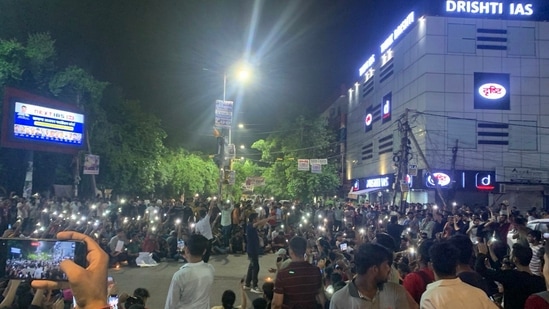Delhi’s coaching center industry is facing unprecedented scrutiny following a series of events that have raised serious questions about safety, regulation, and the future of exam preparation in the capital.
In the heart of Delhi, a crisis is unfolding that threatens to reshape the landscape of competitive exam preparation in India’s capital. The bustling streets of Mukherjee Nagar and Old Rajinder Nagar, long known as hubs for aspiring civil servants, have fallen silent as authorities crack down on coaching centers following a tragic incident that claimed the lives of three young students.

As protests erupt and debates rage, we’ll examine the delicate balance between ensuring student safety and maintaining access to crucial educational resources. Through interviews with affected students, coaching center representatives, government officials, and education experts, this report aims to provide a comprehensive overview of a situation that has captured national attention and could potentially transform the coaching industry in India.
Table of Contents
The Incident That Sparked the Crisis
In July 2024, tragedy struck when three IAS aspirants lost their lives due to flooding in the basement of Rau’s IAS Study Circle. This incident sent shockwaves through the community and brought long-standing safety concerns to the forefront.
Regulatory Response
In response, the Municipal Corporation of Delhi (MCD) has taken swift action, sealing approximately 20 coaching centers in Mukherjee Nagar and Old Rajinder Nagar, including the well-known Drishti IAS. The MCD cites violations of building norms, particularly the illegal use of basements for conducting classes, as the reason for these closures.
“We cannot compromise on student safety,” stated MCD Commissioner Raj Kumar. “These actions are necessary to prevent further tragedies and ensure compliance with regulations.”
Student Protests and Concerns
The sealing of coaching centers has led to significant disruptions for thousands of students preparing for competitive exams. Many have taken to the streets in protest, demanding alternative arrangements and expressing frustration over the sudden interruption to their studies.
Anita Desai, a UPSC aspirant, voiced her concerns: “We understand the safety issues, but what about our futures? We’ve invested time and money in these courses. The authorities need to provide us with viable alternatives.”
Coaching Centers’ Perspective
Representatives from the affected coaching centers argue that the crackdown is too severe and fails to consider the broader context.
Rajesh Sharma, director of a sealed coaching institute, stated, “We acknowledge that improvements in safety measures are needed. However, this blanket sealing of centers punishes those of us who have been working towards compliance. We’re requesting a more nuanced approach that allows centers to rectify issues without completely halting operations.“
Some institutes have transitioned to online classes, but both educators and students report challenges with this format, citing reduced interaction and effectiveness.
Government and Policy Perspective
The Delhi government has announced plans to review and update regulations governing coaching centers. Education Minister Atishi Marlena commented, “This crisis highlights the need for a comprehensive framework that ensures both safety and quality education. We’re working on guidelines that will strike a balance between these priorities.”
The government is also considering measures to support affected students, including the possibility of temporary study spaces and extended exam preparation periods.
Long-Term Implications
Experts suggest that this crisis could lead to significant changes in Delhi’s educational landscape. Dr. Meenakshi Gupta, an education policy analyst, noted, “We might see a shift towards more regulated, purpose-built educational facilities. There’s also potential for increased adoption of blended learning models that combine online and in-person instruction.“
Moving Forward
As the situation continues to evolve, several key questions remain:
- How can safety standards be effectively enforced without disrupting the education of thousands of students?
- What role should technology play in the future of exam preparation?
- How can the government, coaching centers, and students collaborate to create a safer, more effective learning environment?
The coming months will be crucial in determining the future of coaching centers in Delhi. As stakeholders work towards solutions, the incident serves as a stark reminder of the importance of prioritizing safety in educational settings.

